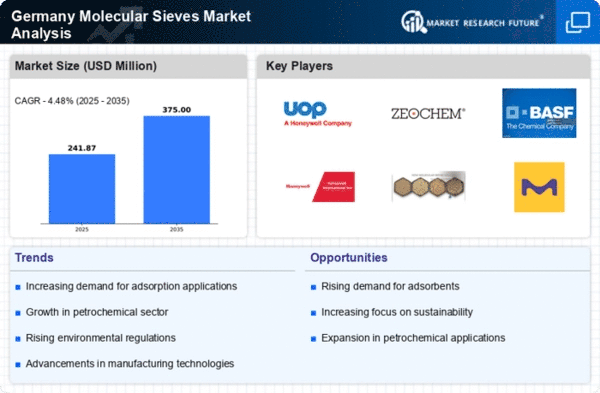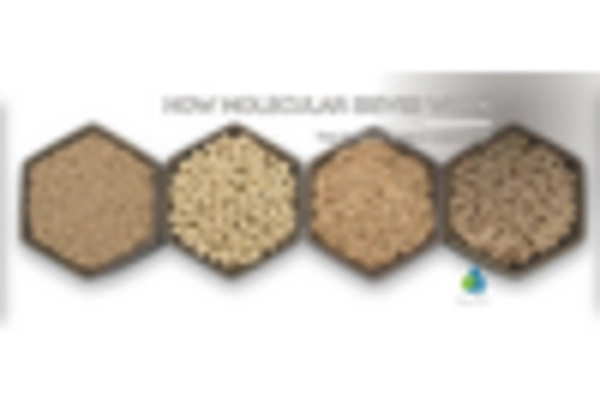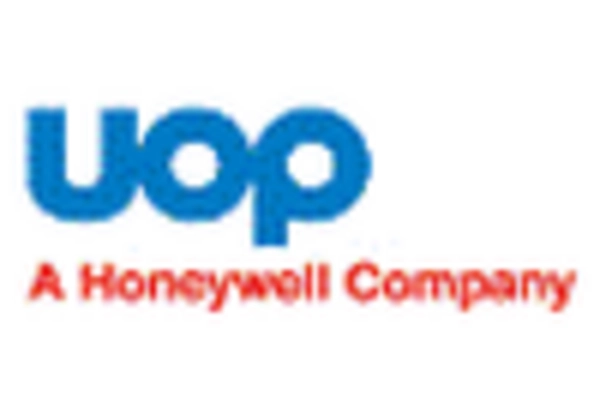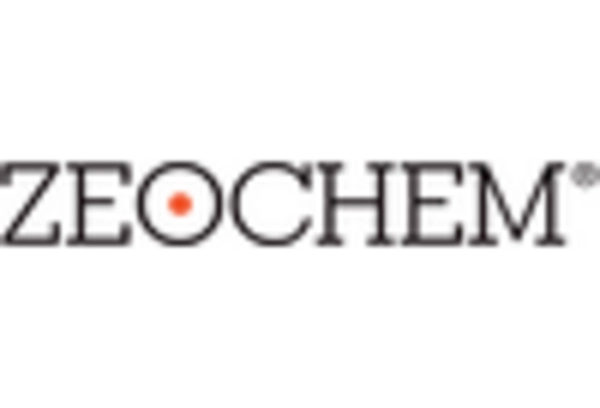The molecular sieves market in Germany is characterized by a competitive landscape that is increasingly shaped by innovation, sustainability, and strategic partnerships. Key players such as BASF SE (DE), Zeochem AG (CH), and Honeywell International Inc. (US) are actively pursuing strategies that emphasize technological advancements and regional expansion. BASF SE (DE), for instance, focuses on enhancing its product portfolio through research and development, which positions it favorably against competitors. Meanwhile, Zeochem AG (CH) is leveraging its expertise in specialty chemicals to cater to niche markets, thereby solidifying its competitive edge. Honeywell International Inc. (US) appears to be concentrating on digital transformation initiatives, which may enhance operational efficiency and customer engagement, collectively shaping a dynamic competitive environment.The market structure is moderately fragmented, with several players vying for market share through localized manufacturing and optimized supply chains. This fragmentation allows for a diverse range of products and services, catering to various industrial applications. The collective influence of these key players fosters a competitive atmosphere where innovation and customer-centric strategies are paramount. Companies are increasingly localizing their manufacturing processes to reduce lead times and enhance responsiveness to market demands, which is crucial in maintaining a competitive advantage.
In October BASF SE (DE) announced a strategic partnership with a leading technology firm to develop advanced molecular sieve technologies aimed at improving energy efficiency in industrial applications. This collaboration is likely to enhance BASF's product offerings and reinforce its commitment to sustainability, aligning with the growing demand for eco-friendly solutions in the chemical industry. The strategic importance of this partnership lies in its potential to position BASF as a leader in innovative, sustainable technologies within the molecular sieves market.
In September Zeochem AG (CH) expanded its production capacity by investing in a new facility in Germany, aimed at meeting the increasing demand for high-performance molecular sieves. This expansion not only signifies Zeochem's commitment to growth but also enhances its ability to serve local markets more effectively. The strategic importance of this move is underscored by the rising demand for specialized products, which could lead to increased market share and improved customer satisfaction.
In August Honeywell International Inc. (US) launched a new digital platform designed to optimize the performance of molecular sieves in various applications. This platform integrates AI and machine learning technologies, enabling customers to monitor and enhance the efficiency of their operations. The strategic significance of this launch lies in its potential to transform customer interactions and operational efficiencies, thereby reinforcing Honeywell's position as a technology leader in the market.
As of November the competitive trends in the molecular sieves market are increasingly defined by digitalization, sustainability, and the integration of advanced technologies. Strategic alliances are becoming more prevalent, as companies recognize the need to collaborate to drive innovation and meet evolving customer demands. The competitive differentiation is likely to shift from traditional price-based competition to a focus on technological innovation, supply chain reliability, and sustainable practices. This evolution suggests that companies that prioritize these aspects will be better positioned to thrive in the future.
















